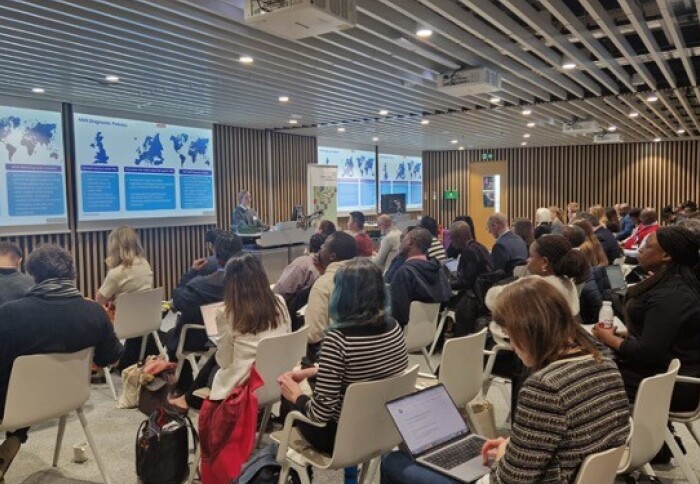Showcasing the next generation of AMR researchers
by Meesha Patel

PhD students and early career researchers showcase the latest advancements in antimicrobial research
The event held on the 6 February, brought together policymakers, and experts in antimicrobial resistance from NHS England, the UK Health Security Agency and academic institutions such as Imperial College London, University of Liverpool and Warwick University. Also in attendance at the hybrid event, were Public Partners and international visitors from the Fleming Fund Fellowships programme, whose home institutions are based in Sierra Leone, Eswatini and Nigeria.
During the event PhD students from the Health Protection Research Unit in HCAI and AMR and the AI4Health Centre for Doctoral Training had the opportunity to give lightning talks on their work. The six covered topics as diverse as investigating antimicrobial resistance in urinary tract infections, to socio-cultural determinants of health and health seeking behaviour to Artificial Intelligence-Driven Clinical Decision Support for Antimicrobial Stewardship. All the researchers highlighted the relevance of their work to policy and how it had the potential to improve antimicrobial stewardship, by optimsing prescribing or informing decision making in relation to resource allocation, or the targeting of interventions to improve infection prevention behaviours.
A question and answer session was facilitated by Dr Raheelah Ahmad, Reader in Health Systems at City University, Research Strategy Advisor (Health Systems & Policy) at the Fleming Initative and the Knowledge Mobilisation Lead for all three HPRU’s currently based at Imperial College.
Presentations from early career researchers followed and similarly highlighted the breadth and interdisciplinarity of AMR research at Imperial College. The audience heard about the role of intelligent data linkage (Dr N.Zhu) and the role of pathogen genomics and how these had been used in maternal (Dr E.Jauneikaite) and neonatal settings (Dr Y.Wan). Examples of existing new innovations were given both as ways to improve infection diagnostics (Dr J Rodriguez Manzano) and as ways to facilitate precision prescribing antimicrobials (Dr T Rawson).

Professor Alison Holmes, Director of the Health Protection Research Unit in HCAI and AMR, and inaugural Director of the Fleming Initiative said: “It was an enormous pleasure to showcase the range of young talent and important research outputs from our impressive group of multidisciplinary collaborative researchers.”
Professor Al Leanord, Chair of the Government Advisory Committee on Antimicrobial Prescribing, Resistance and Healthcare Associate Infections, provided the closing remarks and spoke about the value of the day and the inspiring programmes of work which would continue into the future both nationally and globally.
Established by Imperial College London and Imperial College Healthcare NHS Trust, the Fleming Initiative works to tackle the global threat of antimicrobial resistance. Bringing together researchers, policymakers, and the public, it aims to uncover the causes, raise awareness, and develop solutions - all to drive positive global change. The Fleming Centre, due to open in London in 2028, will act as a blueprint which can be shared and adapted to local contexts around the world.
Article text (excluding photos or graphics) © Imperial College London.
Photos and graphics subject to third party copyright used with permission or © Imperial College London.
Reporter
Meesha Patel
Faculty of Medicine Centre